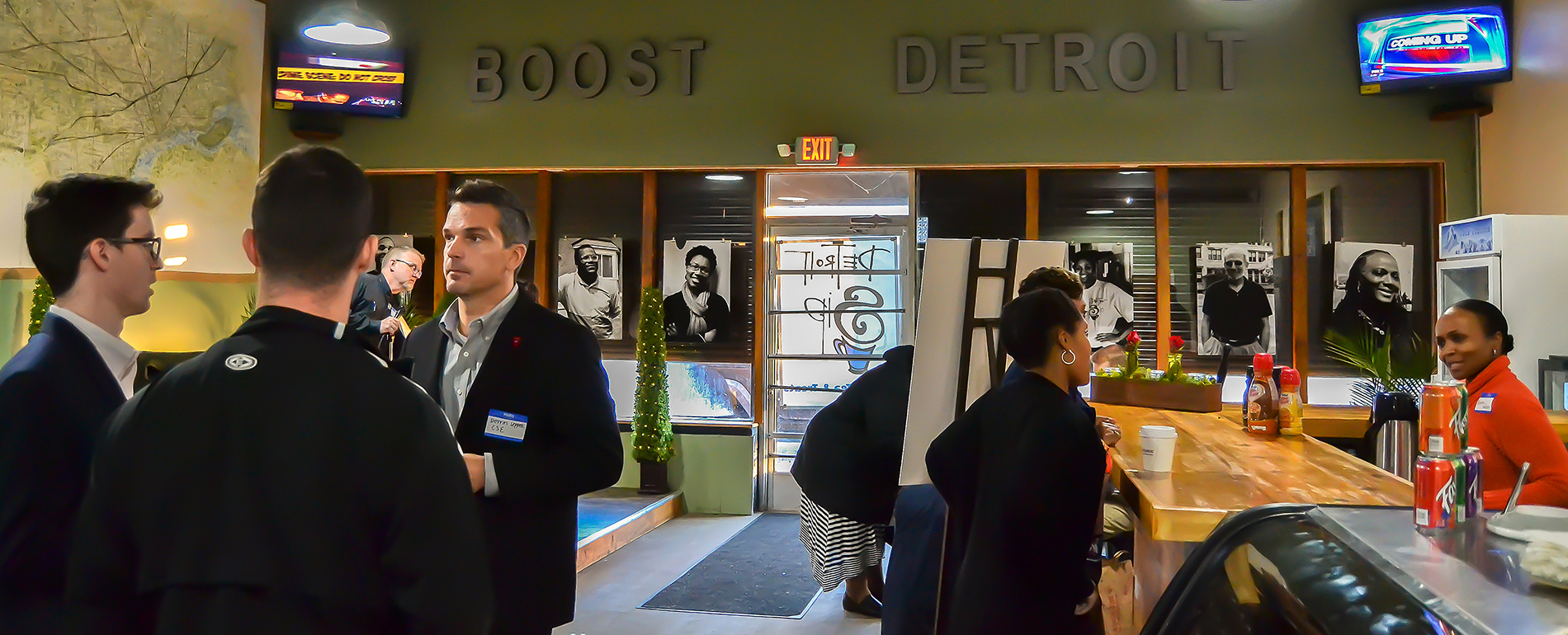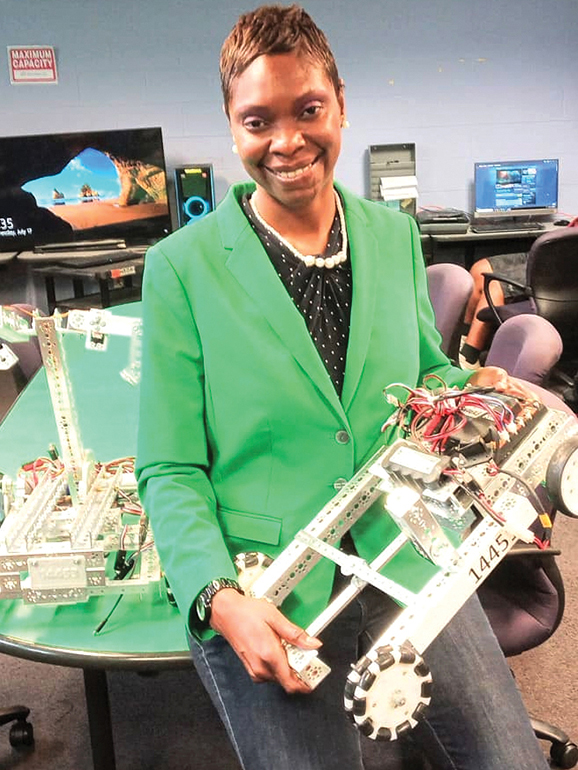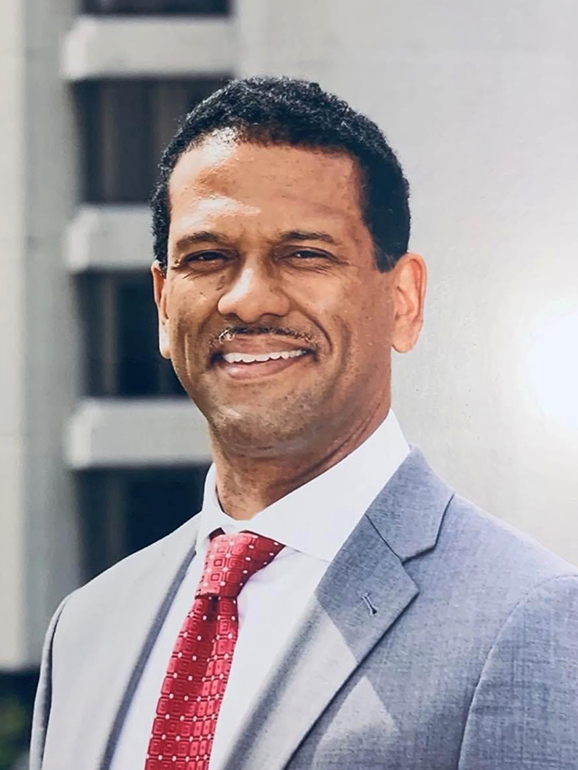
Center for Social Entrepreneurship invests in the community

This story is featured in the Spring 2024 Spiritus magazine, arriving in mailboxes this week.
 Dee Pearl ’05, ’07 used to spend her summers as a teacher leading STEM-based camps in Detroit. It was a way for the longtime educator to introduce young children to science, engineering, technology and math. But a few years into it, she noticed something.
Dee Pearl ’05, ’07 used to spend her summers as a teacher leading STEM-based camps in Detroit. It was a way for the longtime educator to introduce young children to science, engineering, technology and math. But a few years into it, she noticed something.
“I started realizing that I enjoyed my summers a lot more than I did my September through June,” she said. “If I’m still working with kids and able to have an impact, how can I translate the summer camps into a full-time position?”
That realization was the inspiration behind her starting Pearl SMART School, a STEM preschool that focuses on early literacy. She opened her first preschool in Monroe last fall, with a Detroit location scheduled to open this year.
Pearl was able to move her business forward thanks to University of Detroit Mercy’s Center for Social Entrepreneurship, which works with local entrepreneurs who want to address social issues and help communities through business.
The Center provides social entrepreneurs with skills, resources and mentorship through programming such as Boost, a 10-week intensive workshop for early-stage social enterprises.
This work is the mission of the Center, which reached a long-awaited milestone this academic year by issuing the first loans to social entrepreneurs through its Social Innovation Fund.
Pearl and Jermaine Wyrick each received loans of $5,000 to help with their businesses after completing the Boost program and pitching their idea to the Social Innovation Fund’s loan committee. Wyrick started a law firm to represent men in their fight to maintain a presence in their children’s lives.
Social enterprises can face challenges raising funds or getting loans to support their businesses because “they’re not strictly motivated by profit,” said Derrin Leppek, the Center’s director. That’s where the Center and its Social Innovation Fund come in, providing initial support to help them achieve bank-readiness.
“It’s harder to get an investor, like a bank, or others to take on that extra risk that a social enterprise faces,” Leppek said. “We kind of bridge that gap to help them get that initial funding that they need to do important things.”
Impacting the Community
 Wyrick has worked as an attorney for nearly three decades. He started Father’s Justice Law in May 2021 because of his own “existential crisis.”
Wyrick has worked as an attorney for nearly three decades. He started Father’s Justice Law in May 2021 because of his own “existential crisis.”
“I went through a custody dispute involving my minor daughter,” he said. “It enlightened me in terms of advocacy that’s needed to fairly and justly handle cases on behalf of men in family court.”
Based out of Taylor, Father’s Justice Law works with men in the areas of custody, parenting time, divorce and prenuptial agreements. Wyrick does this work to help ensure that men can be involved in all areas of their children’s upbringing.
“We’re not just looking at the short-term service that we give men while they’re facing a custody dispute or divorce,” Wyrick said. “We’re looking at 10, 15, 20 years down the road, when their kids grow up. Do they become a better, happier or more emotionally stable adult because they had their dad in their lives?”
Wyrick says yes and he’s backed up by data. According to research collected by The Fatherhood Project, involved fathers who use authoritative and loving parenting can lead to better emotional, academic, social and behavioral outcomes in their children.
Getting a Boost
The Center’s Boost program offers social entrepreneurs a thorough jumpstart in the early stages of their businesses.
A wide range of business fundamentals are covered in the program, from mission statements, legal and marketing to strategic thinking, finances and business models. Communication is a key aspect to help social entrepreneurs develop the ability to pitch their businesses.
Leppek teaches Boost to social entrepreneurs, but UDM alumni and students also play a role. Alumni mentor participants and give presentations on their expertise, while students assist by solving problems in the classroom. In return, some of the businesses have welcomed UDM students as interns.
Boost is taught by Leppek every fall and winter. More than 100 people have gone through the program, which is completing its 15th cohort. There is no cost to the social entrepreneurs for participating, as tuition is covered by alumni support and corporate sponsorships.
Leppek sees the social entrepreneurs helping each other during class sessions.
“They’re all giving input to each other and helping each other solve problems, which is really beautiful, because that peer support and sharing knowledge is highly effective,” he said.
That peer support helped Wyrick, who was drawn to Boost because of its social impact, make partnerships with other participants in areas such as marketing.
Boost appealed to Pearl because of the Jesuit and Mercy values of giving back, which were instilled in her while studying at UDM. She participated in two cohorts to solidify her business plan and believed that discussions with her peers were impactful.
“As a social entrepreneur, is it about the money or is it about the people you ultimately want to touch?” Pearl said. “Having those conversations and being in class with other social entrepreneurs, it definitely gave us a meaning point.”
As Pearl SMART School grows, Pearl wants to be intentional when considering additional locations.
“We’re looking at areas that have childcare deserts,” Pearl said. “There’s a lot of data around the different counties that are struggling with the lack of preschools and childcare options. We’re looking for areas where we can be impactful in our state.”
Making a Difference
Issuing the first loans to social entrepreneurs through the Social Innovation Fund wasn’t an overnight process. It’s something Leppek had been working on for several years.
After raising funds and getting everything in place, the Center held its first funding round during the winter 2023 semester.
During the funding round, entrepreneurs pitch their social enterprises to the Center’s loan committee, which consists of members from its advisory board and CBA students and faculty. The loan committee looks at two things, Leppek said: The ability of the loan to move the business forward and the social entrepreneur’s ability to repay it.
After listening to pitches and asking entrepreneurs questions, a collective decision is made.
“It’s a process that works, because they get vetted pretty thoroughly,” Leppek said. “Students get a great benefit from this, too, because they’re part of this process of determining if a business is loan worthy.”
No loans were issued during the Center’s first funding round, but last fall, Pearl and Wyrick successfully pitched their businesses to the committee.
“It’s definitely given us a boost to continue with our work of impacting kids with our preschools,” Pearl said.
Working with the social enterprises, Leppek sees the UDM students applying what they learn in the classroom. “On top of that,” he said, “they’re engaging with local businesses that are doing good. It shows that business can be done in this way that helps others.”
Participating in the loan committee and learning from people experienced in business was effective for Jason Zanchetta, a student in the five-year MBA program.
“All of these businesses that are pitching to us have some kind of core value in improving community,” Zanchetta said. “It’s very fulfilling to be able to be involved in giving out these loans, but it has a higher purpose.”
With the Center’s first loans issued, Leppek is hopeful that the businesses can be successful and have a positive impact in the community.
“We owe it to Detroit to help make our community better, and that’s what we’re doing at the most basic level,” he said. “I want the entrepreneurs to be successful more than anything, because if they’re successful, everybody wins. They’re better because they have a sustainable living, they’re comfortable, but they’re improving the lives of others.
“Being able to serve in this way to make Detroit a better place for everyone, it’s something I’m really proud of. I’m happy that we can do this for everybody involved.”
— By Ricky Lindsay. Follow Detroit Mercy on Facebook, LinkedIn, Twitter and Instagram. Have a story idea? Let us know by submitting your idea.